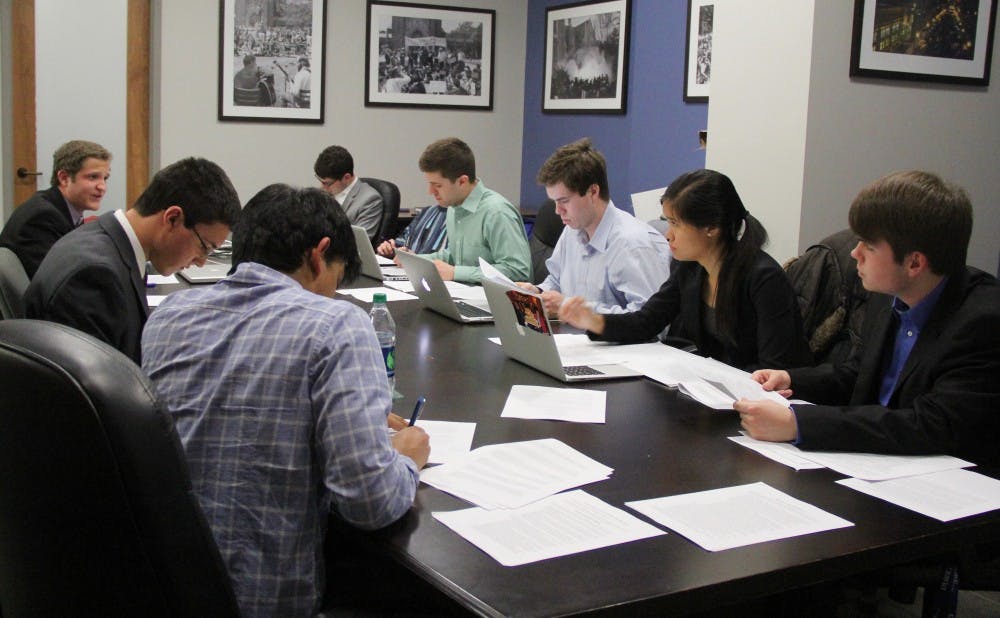In a decision made entirely over email, the Duke Student Government Judiciary ruled that more than $40,000 recovered from inactive student groups will not go back to DSG Senate.
After DSG and the Student Organization Funding Committee dechartered 83 inactive student groups, more than $40,000 was recovered from their funding accounts—leftover from student activities fees allocated years ago. Members of DSG and SOFC had for months touted this recovery as a sign of SOFC's improving transparency and efficiency. But when they approached the Judiciary two weeks ago to sign off on the transaction, the Judiciary decided to give the funds instead to University Center Activities and Events for allocation. To some, however, it is still up in the air whether or not the Judiciary—which is not a money-allocating body—has the authority to make a decision like this.
Although the details of the plan still need to be finalized, UCAE will use the money to fund campus improvement projects that students deem to be the most important, said sophomore Max Schreiber, chief justice of the Judiciary.
“It is like Fix My Campus, but with funding,” said Schreiber, who is running for DSG vice president of facilities and the environment. “This is going to do a lot of good things for the campus.”
He described a process by which students submit ideas for improvements to be approved by UCAE based on their feasibility. The projects would be put to a student-wide vote to determine which ones are most broadly supported, and the surplus $40,000 will then be allocated based on ordered student preference. Schreiber is optimistic that the details of the plan will be finalized and implemented for later this month or early in the Fall.
Typically, SOFC decides where student activities fees go on a year-by-year basis, and UCAE issues the money.
Junior Nikolai Doytchinov, DSG executive vice president, said there is still a chance that the Senate would regain control of the funding to be allocated through SOFC, though he was unsure of how this could happen.
“The final decision is still pending,” he said, noting that any final decisions would have to be made in consultation with UCAE.
Schreiber, however, said the decision is final. He added that the Judiciary consulted UCAE representatives while making their decision.
“The idea has been approved. The idea has been decided on, but we don’t have any of the logistics of it,” Schreiber said.
Following the decision that DSG could not retroactively take back funds, the Judiciary discussed several potential options for reallocating the money—including returning it to students or allowing DSG to have it in lieu of raising the student activities fee—but ultimately felt distributing it to student-generated projects was the fairest and most feasible idea, Schreiber said.
“It is their money, not our money,” he said of the student body.
Doytchinov said the bylaws require the Judiciary to approve the dechartering of groups, but the process is “automatic” if the groups meet certain criteria. He noted that the process of asking the Judiciary to sign off on the Senate retrieving the funds was intended to be a check and balance between the two bodies, not to give the Judiciary the power to decide where the money goes.
The bylaws state, "The disposition of [dechartered groups'] assets shall be at the discretion of the Judiciary in consultation with UCAE."
The Judiciary interpreted this to mean that they could overrule the Senate’s claim on the funding and appropriate the money at their discretion. Doytchinov said this was “a little bit of an oversight” on part of the bylaw.
The Judiciary thought the Senate should not get the money for a number of reasons—it is possible some of the reclaimed funds were privately raised, it would allow SOFC to use debt as leverage, and the money should go back to students if possible because it was theirs in the first place, Schreiber said.
Schreiber said the majority of the communication to reach this conclusion was done via email between justices, adding that he was unsure if this type of decision was really within the Judiciary’s purview.
“We only have to meet in person if there was an actual hearing,” Schreiber said.
This is the first time in his memory that the Judiciary was asked to issue a decision outside of an official case, he added.
Doytchinov, however, noted that this was an official case of DSG versus the inactive student groups.
Get The Chronicle straight to your inbox
Signup for our weekly newsletter. Cancel at any time.

